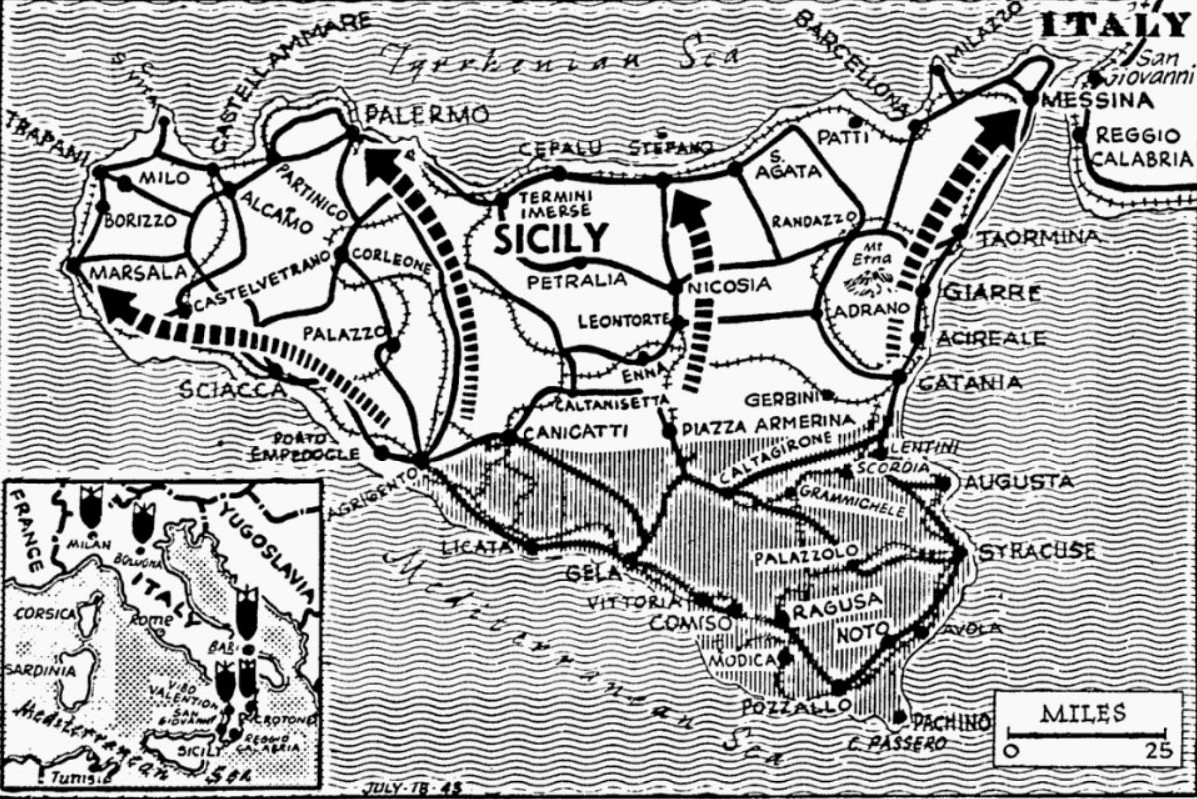With the Allies in Sicily –
Trail of death and ruin left behind by 7th Army
War correspondents tell of fighting in Sicily, give sidelights on invasion
By C. R. Cunningham, representing the combined U.S. press
Reports from war correspondents with U.S. and British forces in Sicily are often delayed for many days before transmission facilities are available, but they give an interesting picture of the invasion and background for today’s news. The following dispatches arrived today.
With U.S. 7th Army, Sicily, Italy (UP) – (July 13, delayed)
A trail of death and ruin – wrought in many cases by U.S. soldiers of Italian descent – lay behind the American 7th Army pushing northward through Sicily today.
And the Italo-American in this outfit are as anxious to get the job done, at whatever cost, as any other man.
Pvt. Jim Sangemino of Brooklyn, New York, whose parents came from Sicily, said:
I hope they put up the white flag. But if they’re really going to give us a scrap, we’ll give it right back to them.
Big tanks knocked out
Dead Germans and Italians, burned-out tanks, at least of 20 of which were German Mark VI Tigers smashed around Gela alone, gave testimony to the striking power of the Yankees. I saw the destruction they left behind on an 80-mile jeep ride from a beach command post east of Gela, through Gela, Vittoria and Comiso and on to Ragusa.
As we saw bodies hanging from burned-out armored vehicles, my driver, Pvt. Vincent Sokol, of Chicago, said:
It’s too bad we’ve gotta kill a lot of these palookas. But it was a question of their lives or ours and I’m damned sure it isn’t going to be mine if I can help it.
People nervous
On the road between Gela and Vittoria, there were at least two dozen knocked-out enemy tanks, some of them still smoking. Gela was a dirty-looking spot, not too badly battered by the fight that raged around it. Its inhabitants are mostly old men and women and children, plus a few Sicilians who escaped Mussolini’s conscription.
The people in Gela, underfed and nervous, nearly go crazy when planes approach.
The people in Vittoria were hostile at the start although the town was practically untouched. Now thousands of soldiers are pouring in, handing out cigarettes in exchange for wins.
Through this part of the country our vehicles ramble through at high speed because there are snipers still left in the hills. Our jeep was fired upon numerous times.
Barbers with razors don’t scare Yanks
With U.S. 7th Army, southern Sicily, Italy (UP) – (July 14, delayed)
Two U.S. paratroopers – Pvt. Wilfred Thomas of Milton, Oregon, and Pvt. Cecil E. Prine of Bartow, Florida – related how they had killed or helped to kill six enemy troops since landing on Sicily as they waited their turn today in the chair of a Sicilian barbershop.
As Prine told about his foray, the Sicilian barber turned toward the two. The chair was empty. Thomas, who had told of killing three Italians, got into the chair, looked at the little barber waiting with a razor, then leaned back, bared his throat and said calmly, “Shave.”
Yanks take airfield, then raid from it
Advance airdrome, Sicily (UP) – (July 14, delayed)
The first U.S. fighter group landed in Sicily occupied this airdrome today and immediately began making 26 missions a day –virtually a non-stop job of flying – over main beachheads established by U.S. troops.
Veterans of air battles over England, France, Algeria and Tunisia, the men of this outfit were handpicked to lead the air battle over Sicily. This group, which shot down 27 enemy planes when the Allies took Pantelleria, has already shot down 12 enemy planes since beginning operations against Sicily.
Faith in Hitler gone, says Nazi youth
With U.S. 7th Army, Sicily, Italy (UP) – (July 15, delayed)
There is evidence the youth of Germany – at least the youth fighting on Sicily – have lost faith in the Hitler regime.
One young German prisoner told American officers:
Life in Germany today is the most modern form of slavery.
Lack of opposition puzzles U.S. pilots
With U.S. forces, Sicily, Italy (UP) – (July 15, delayed)
Failure of Axis planes to attack U.S. forces with any semblance of strength constitutes one of the major mysteries of the Sicilian campaign, U.S. officers said today.
The Americans had expected plenty of air battles over Sicily.
Italian prisoners said there were simply no pilots to take up their planes and that at the Comiso Airfield, German air personnel pulled out as the Americans pushed toward the field.
Harold Boyle, representing the combined U.S. press, said in a dispatch datelined July 14 that one reason for the “fading Axis air strength” was the Allied bombing attack that wrecked Comiso. The airfield, Boyle wrote, was strewn with bodies of German soldiers, pockmarked with huge craters and covered with wreckage of 75-100 enemy planes ranging from transports to fighters.
Yanks use pistols, stop Axis tanks
With U.S. troops, Niscemi, Sicily, Italy (UP) – (July 13, delayed)
The men of the 2nd Battalion, who went through the hell of Hill 41, marched into Niscemi today.
With a single anti-tank gun, they refused to yield before a mass attack by 20 German tanks and used pistols on the enemy armor when they had nothing else.
They even staged a counterattack.
Of the 48-hour flight, Capt. Robert Irvine of Framingham, Massachusetts, said:
You’re supposed to have anti-tank guns against tanks, not supposed to fight them with your hands. But that’s almost what we had to do.
I saw tanks knocked out by mortars. I saw men stand up in slit trenches and shoot pistols and grenades at them. One man even threw an anti-tank rifle grenade at a tank from close range and he set it afire.

